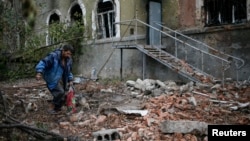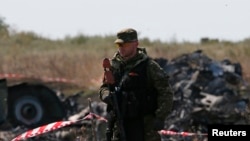Ukraine’s national security spokesman said Thursday Russian forces are conducting a multi-faceted campaign from their own side of the border against Ukrainian troops. The allegation came a week after the downing of the Malaysian airliner in the rebel-held part of eastern Ukraine.
Colonel Andriy Lysenko says the Russian troops across the border are using a variety of weapons to attack Ukrainian units that are fighting Russian-backed separatists.
Lysenko, spokesman for Ukraine’s National Security and Defense Council, said that in the last 24 hours Russian forces have fired Grad missiles at six Ukrainian checkpoints, including one at the Luhansk airport. He said they also fired artillery shells, grenades and small arms at various locations along the border.
At Kyiv’s International Center for Policy Studies, Iaroslav Kovalchuk said the direct action by the Russian army significantly changes the military balance in the region.
“There are Russian troops that try to provoke the Ukraine army, that try to destabilize the whole border, but Ukrainian troops cannot [do] anything because it would be considered a military response," he said. "So, the situation is very tricky and the direct involvement of Russia really aggravates the whole status quo in the east."
The Russian military involvement appears to indicate that President Vladimir Putin is not willing to allow the separatists to lose in eastern Ukraine. But Kovalchuk said Putin’s calculation may change in the coming months, in the wake of the Malaysia Airlines disaster and as international sanctions begin to bite.
MH17 crash site access
In eastern Ukraine, where Malaysia Airlines flight MH17 was shot down a week ago, rebels have allowed only a limited number of foreigners to access the sites where remnants of the plane are scattered. Most of them are observers from the Organization for Security and Cooperation in Europe, along with a handful of international experts who have managed to reach the area.
OSCE spokesman Michael Bociurkiw told reporters that a week after the incident, members of his team finally got to one of the major sites on Thursday.
“Just now we visited an impact sight which we hadn’t visited before, but it had, by far I think, the most pieces of kind of large, intact debris," he said. "In a wooded area, for example, we saw a piece with the window still intact, and it was very, very large.”
Bociurkiw said he saw no local experts working in the area on Thursday.
The head of Ukraine’s Emergency Services agency says there is no plan for locally-based workers to resume the search until experts in the Netherlands determine how many bodies have already been recovered. Initial reports said all 298 bodies were aboard rail cars sent out of the rebel zone this week, but officials say that may not be true. The emergency chief said the last of the bodies received from the train should be transported to Amsterdam by Friday.





